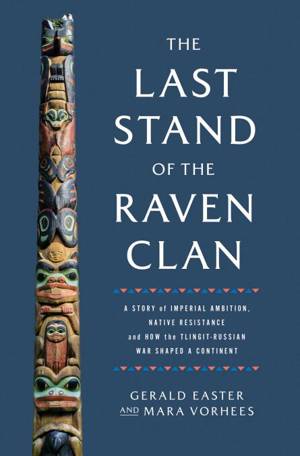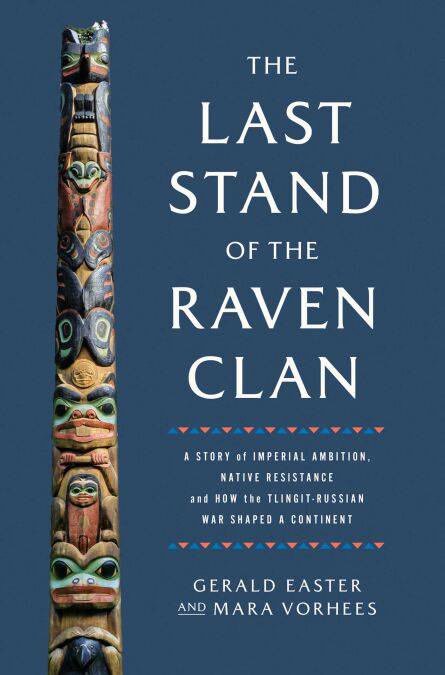
- Afhalen na 1 uur in een winkel met voorraad
- Gratis thuislevering in België vanaf € 30
- Ruim aanbod met 7 miljoen producten
- Afhalen na 1 uur in een winkel met voorraad
- Gratis thuislevering in België vanaf € 30
- Ruim aanbod met 7 miljoen producten
Zoeken
The Last Stand of the Raven Clan E-BOOK
A Story of Imperial Ambition, Native Resistance and How the Tlingit-Russian War Shaped a Continent
Gerald Easter, Mara Vorhees
E-book | Engels
€ 20,12
+ 20 punten
Omschrijving
A dynamic history of the Battle of Sitka that recognizes the vital importance of the Tlingit people, their fight against Imperial Russia, and how it changed the fate of the North America.
“If the long-term plans of Peter the Great had been realized, then California never would have become a Spanish colony,” asserted the head of the Russian-American Company. At the turn of the nineteenth century, Russia was a rising power in North America. The Tsar’s empire extended across the Bering Sea, through the Aleutians and Kodiak Island, and down the Alaskan panhandle. The objective of this imperialist project was to corner the lucrative North Pacific fur trade and colonize the American coastline all the way to San Francisco Bay. The audacious scheme was moving apace until the Russians were finally confronted and stalled on the battlefield.
When Russia went to war in America, the fate of a continent was at stake. Yet it was neither the Old-World rivals Spain and Britain nor the upstart United States who stopped Russian expansion, but a coalition of defiant Tlingit tribes. The Last Stand of the Raven Clan is the true story of how the indigenous Tlingit people of southeast Alaska thwarted Imperial Russia’s grand plan of conquest in North America. Leading the charge was the young war chief K'alyáan, a hero as fierce and courageous as Crazy Horse or Geronimo. The Tlingit stance against Russian colonization—during the Battle of Sitka and beyond—was arguably the most successful indigenous resistance against European imperialism in North America.
Tlingit oral histories and Russian eyewitness accounts bring this history to life, shedding light on events both inspiring and infamous: the Massacre at Refuge Rock, one of Native America’s worst atrocities; the Survival March, the perilous Tlingit retreat to avoid Russian capture and enslavement; and the cutthroat competition between the U.S. and Russia to control the northern Pacific. Ultimately, The Last Stand of the Raven Clan chronicles the determined struggle for survival of the Tlingit people in their ancestral homeland and places the Battle of Sitka in its rightful spot as a key turning point in North American history.
“If the long-term plans of Peter the Great had been realized, then California never would have become a Spanish colony,” asserted the head of the Russian-American Company. At the turn of the nineteenth century, Russia was a rising power in North America. The Tsar’s empire extended across the Bering Sea, through the Aleutians and Kodiak Island, and down the Alaskan panhandle. The objective of this imperialist project was to corner the lucrative North Pacific fur trade and colonize the American coastline all the way to San Francisco Bay. The audacious scheme was moving apace until the Russians were finally confronted and stalled on the battlefield.
When Russia went to war in America, the fate of a continent was at stake. Yet it was neither the Old-World rivals Spain and Britain nor the upstart United States who stopped Russian expansion, but a coalition of defiant Tlingit tribes. The Last Stand of the Raven Clan is the true story of how the indigenous Tlingit people of southeast Alaska thwarted Imperial Russia’s grand plan of conquest in North America. Leading the charge was the young war chief K'alyáan, a hero as fierce and courageous as Crazy Horse or Geronimo. The Tlingit stance against Russian colonization—during the Battle of Sitka and beyond—was arguably the most successful indigenous resistance against European imperialism in North America.
Tlingit oral histories and Russian eyewitness accounts bring this history to life, shedding light on events both inspiring and infamous: the Massacre at Refuge Rock, one of Native America’s worst atrocities; the Survival March, the perilous Tlingit retreat to avoid Russian capture and enslavement; and the cutthroat competition between the U.S. and Russia to control the northern Pacific. Ultimately, The Last Stand of the Raven Clan chronicles the determined struggle for survival of the Tlingit people in their ancestral homeland and places the Battle of Sitka in its rightful spot as a key turning point in North American history.
Specificaties
Betrokkenen
- Auteur(s):
- Uitgeverij:
Inhoud
- Aantal bladzijden:
- 336
- Taal:
- Engels
Eigenschappen
- Productcode (EAN):
- 9781639367375
- Verschijningsdatum:
- 28/10/2024
- Uitvoering:
- E-book
- Beveiligd met:
- Adobe DRM
- Formaat:
- ePub

Alleen bij Standaard Boekhandel
+ 20 punten op je klantenkaart van Standaard Boekhandel
Beoordelingen
We publiceren alleen reviews die voldoen aan de voorwaarden voor reviews. Bekijk onze voorwaarden voor reviews.











